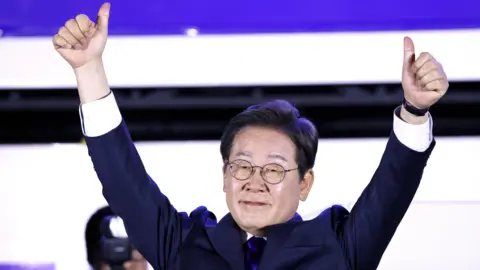In a remarkable turn of events within South Korean politics, the opposition candidate, Lee Jae-myung, has won the presidency, marking a decisive victory just six months after the controversial bid for martial law by former President Yoon Suk Yeol failed spectacularly. This unexpected political upheaval set the stage for widespread protests and eventually led to Yoon’s impeachment and removal from office, leaving him facing pending criminal charges related to abuse of power. Lee’s rise to power comes with the daunting task of uniting a deeply polarized nation still grappling with the ramifications of recent political chaos.
The previous regime’s tumultuous end opened the door for Lee, but he faces significant challenges not only domestically but internationally as well. A pivotal concern will be negotiating trade agreements with the United States, particularly under President Donald Trump, as South Korea seeks to mitigate the effects of tariffs imposed by its closest ally. The political environment is charged, and Lee’s ability to navigate these waters will be critical as he attempts to regain public trust while steering the country toward stability.
Lee’s principal opponent was the ruling People’s Power Party (PPP) candidate, Kim Moon-soo, who had previously served in Yoon’s cabinet. Despite trailing Lee in the polls leading up to the election, Kim conceded defeat early in the morning on the day following the election, congratulating Lee on his victory. With an election focused on restoring the nation’s faith in democracy, Lee emphasized the recovery of South Korea’s political landscape as his primary goal, especially in light of his previous close loss to Yoon just three years ago by a narrow margin.
This latest election is undeniably a remarkable comeback for Lee, whose political path has been fraught with challenges, including investigations into alleged corruption and family scandals. Analysts interpret Lee’s victory as a clear rejection of the ruling party’s actions, particularly the martial law measures initiated by Yoon’s administration. According to Park Sung-min, president of Min Consulting, the electorate’s choice reflected a significant desire to uphold democratic values rather than overwhelming support for Lee’s campaign platform.
While election turnout was notably high at approximately 79.4%—the most substantial since 1997—Lee’s challenges are far from over. He steps into office with a detrimental legal cloud hovering above him, as he faces a Supreme Court trial for election law violations that could inhibit his ability to govern if convicted. Although South Korea’s constitution prohibits the prosecution of sitting presidents for most criminal offenses, the implications of his trial raise complex questions about how Lee can effectively lead amid these legal challenges.
Lee’s political journey has been one of resilience. He emerged from a humble background, working his way up through the ranks of the Democratic Party (DP) to become their presidential candidate. His previous platform focused on liberal reforms, yet following his electoral loss, he adopted a more centrist approach in this recent campaign. As Lee prepares to serve in office, he will need to find a way to bridge divides in a nation where political polarization has become increasingly pronounced.
In addition to domestic issues, Lee must engage with the PPP to foster public trust and address the fractured political landscape. Years of division under previous administrations have left South Korea at a critical junction, and Lee is tasked with the burden of pursuing accountability for Yoon’s actions while simultaneously seeking to heal the divisions that threaten to further fragment the country.
The future political landscape also raises questions about the ambitions of figures such as Lee Jun-seok, who, having bowed out of the presidential race, has considerable support among young, right-leaning voters. With Yoon’s departure, Lee Jun-seok’s popularity indicates the potential for new leadership emerging from the right, which underscores the ongoing political tensions within South Korea.
As Lee takes office in this climate of uncertainty, he has pledged to prioritize domestic stability and international cooperation, fully aware of the challenges that lie ahead. He expressed an unwavering commitment to fulfilling the expectations of the South Korean public, recognizing the daunting responsibilities that come with the presidency in such turbulent times.



